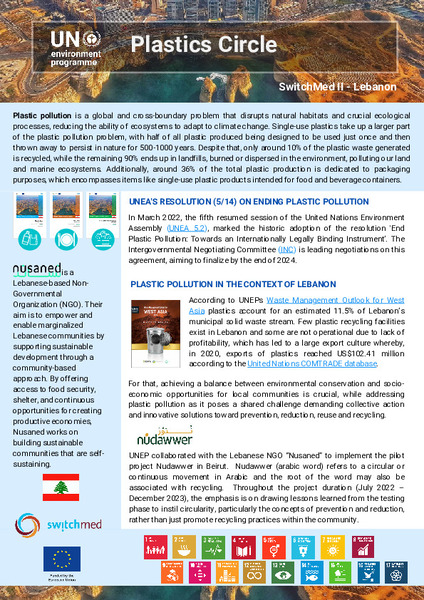| dc.contributor | Industry and Economy Division | en_US |
| dc.contributor.author | United Nations Environment Programme | en_US |
| dc.coverage.spatial | Lebanon | en_US |
| dc.date.accessioned | 2023-12-19T07:51:05Z | |
| dc.date.available | 2023-12-19T07:51:05Z | |
| dc.date.issued | 2023-12 | |
| dc.identifier.uri | https://wedocs.unep.org/20.500.11822/44488 | |
| dc.description | Plastic pollution is a global and cross-boundary problem that disrupts natural habitats and crucial ecological processes, reducing the ability of ecosystems to adapt to climate change. Single-use plastics take up a larger part of the plastic pollution problem, with half of all plastic produced being designed to be used just once and then thrown away to persist in nature for 500-1000 years. Despite that, only around 10% of the plastic waste generated is recycled, while the remaining 90% ends up in landfills, burned or dispersed in the environment, polluting our land and marine ecosystems. Additionally, around 36% of the total plastic production is dedicated to packaging purposes, which encompasses items like single-use plastic products intended for food and beverage containers. | en_US |
| dc.format | pdf | en_US |
| dc.language | English | en_US |
| dc.rights | Public | en_US |
| dc.subject | plastic | en_US |
| dc.subject | plastic waste | en_US |
| dc.subject | climate change | en_US |
| dc.title | Plastics Circle: SwitchMed II in Lebanon - SwitchMed Programme [Factsheet] | en_US |
| wd.identifier.sdg | SDG 3 - Good Health and Well-being | en_US |
| wd.identifier.sdg | SDG 15 - Life on Land | en_US |
| wd.topics | Chemicals and Pollution Action | en_US |
| wd.identifier.pagesnumber | 2 p. | en_US |


